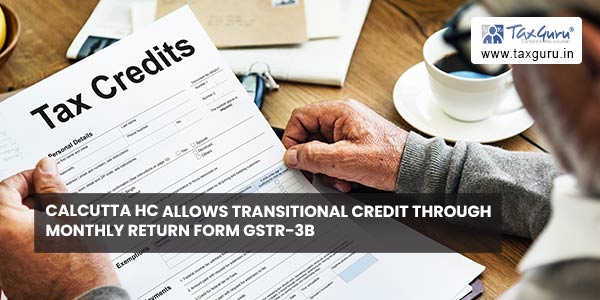Case Law Details
Haldia Petrochemicals Ltd. & Anr. Vs Commissioner of State Taxes & Ors. (Calcutta High Court)
The Hon’ble Calcutta High Court in the case of Haldia Petrochemicals Ltd. & Anr. Vs. Commissioner of State Taxes &Ors., (WPA No. 12239 OF 2019 etc), vide its judgment dated July 1st, 2022, allowed relief of transitional credit in a bunch of petitions wherein the assessee could not upload Form TRAN-1 in time or in appropriate form on account of technical glitch or on account of not being felt sensitized with the system or on account of other connectivity issues or when the assesses/dealers were located in remote corners.
The common but most important feature in all these cases was that the entitlement of the writ petitioners to the input credit had crystallized. This crystallized right, which had ripened into the vested right, was being denied on account of procedural problem.
The Hon’ble High Court granted liberty to the petitioners to file individual tax credit in Form GSTR-3Bfor the month of June, 2022 to be filed in the month of July, 2022 subject to verification of genuineness of the claim of the petitioner by the respondent GST authorities after filing of the claim in Form GSTR-3B.
This matter was represented by Advocate Vinay Shraff, Advocate Ms.Priya Sarah Paul, Advocate Kaushal Agarwal, Advocate Rahul Dhanuka for the Petitioners and Mr. K.K. Maiti, Mr. Bhaskar Prasad Banerjee, Mr. Tapan Bhanja for respondents.
FULL TEXT OF THE JUDGMENT/ORDER OF CALCUTTA HIGH COURT
Heard learned advocate appearing for the parties.
All these writ petitions are heard and disposed of by this common order for similarity of the issues involved in all these writ petitions.
According to the petitioner, in these bunch of writ petitions are similar in facts and question of law involved like in a bunch of cases which have been finally decided by the Division Bench of this Court by a judgement dated 14.12.2021 in the case of Nodal Officer, Jt. Commissioner, IT Grievance, GST Bhawan – Vs – M/s. Das Auto Centre being MAT 552 of 2020 with CAN 1 of 2020 and CAN 2 of 2020 and another Division Bench judgement of this Court dated 27th April, 2022 in the case of Principal Commissioner of CGST & CX, Howrah Commissionerate – Vs – Bengal Hammer Industries (P) LTD. & Ors. being APOT No. 40 of 2022 with GA 2 of 2022 and WPO 240 of 2019 and petitioner also relies on a recent unreported decision of the Bombay High Court, dated 27th June, 2022 in the case of Chep India Private Limited – Vs – Union of India & Ors. being Writ petition No. 1075 of 2021.
In my view relevant portion of the judgement of the appeal Court, dated 14.12.2021 in the case of Nodal Officer, Jt. Commissioner, IT Grievance, GST Bhawan (Supra) are required to be quoted as hereunder :
In the bunch of writ petitions the facts may be slightly different in the sense that each of the writ petition may have a peculiar problem but the common feature in all the writ petitions is that on account of a technical glitch or on account of the assesses not being felt sensitized with the system or on account of other connectivity issues or when the assesses/dealers are located in remote corners of the State Form TRAN-1 could not be uploaded in time or in appropriate form.
The other common but most important feature in all these cases is the entitlement of the writ petitioners to the input credit has crystallized. This crystallized right, which ripened into the vested right, is now being denied to the writ petitioners on account of procedural problem. In this factual background, we require to examine as to whether the order or direction passed by the learned Single Judge was appropriate or otherwise.
Thus, we are fully convinced that the decision which were rendered above have clearly brought out the difficulties faced by the assesses and also as to how the assesses having substantially complied with the requirement under law and having been entitled to credit on account of transition to the GST regime which is beyond the purview of the assessee and the assessee cannot be put to prejudice on account of technicalities. Thus, keeping the underlying principle in mind if the matter is examined then we are inclined to lean in favour of the writ petitioners and affirm the directions issued by the learned Single Judge. We note from the directions issued by the learned Single Judge that the authorities have been directed to open the portal so that the assessee may be able to file their respective TRAN-1 return or revise return or re-revise return. In our considered view, this would be a difficult exercise and such cannot be run by the assessing Officer in whose jurisdiction the assessee is carrying business. It probably will have to be done at the very higher level and consequently direction, if any, issued to open the portal, would become unworkable qua prayer made by the writ petitioners. While pondering on the face of the issue, we refer the decision of the Punjab and Haryana High Court in the case of Hans Raj Sons vs. Union of India reported in 2020 (34) GSTL 58 (P & H). In the said decision the Court while allowing the writ petition had granted two options one by directing opening of the portal and in case of non-opening of portal the writ petitioner/assessee will be entitled to make unutilized credit in their GST 3B forms to be filed on the monthly basis. This in our considered view, will be a workable solution and the Assessing Officer will be entitled to examine the legality of the claim on such form being filed by the assessee.

Thus, for the above reasons, we find that the substantial part of the order and the directions issued by the learned writ Court as well as reasoning given merits acceptance. However, we are of view that instead of directing the portal to be open, the direction issued in Hans Raj Sons (supra) is more assessee friendly. We also find identical directions have been issued in the case of Amba Industrial Corporation vs. Union of India reported in (2020) 117 Taxman. Com 195 (P & H).
Considering and following the aforesaid judgements of the Division Bench of this Court as well as Bombay High Court all these writ petitions are disposed of by granting liberty to the petitioners to file individual tax credit in GSTR-3b forms for the month of June, 2022 to be filed in the month of July, 2022 subject to verification of genuineness of the claim of the petitioner in all these cases and respondent GST authorities concerned shall allow the claim of these writ petitioners if it is found that the cases of the writ petitioners are similar to the facts involved in all the aforesaid decisions. Though Mr. Maiti, learned advocate appearing for the respondents submits that the facts involved in these writ petitions are not similar to the facts involved in the aforesaid judgments of the Division Bench of this Court but that will be subject to verification by the assessing officers.
With this observation all these writ petitions being W.P.A. 12239 of 2019, WPA 10104 of 2021, WPA 5065 of 2020, WPA 5573 of 2020, WPA 5627 of 2020, WPA 5734 of 2020 with CAN 1 of 2020, CAN 3681 of 2020, WPA 7926 of 2021 and WPA 8985 of 2020 stand disposed of.





